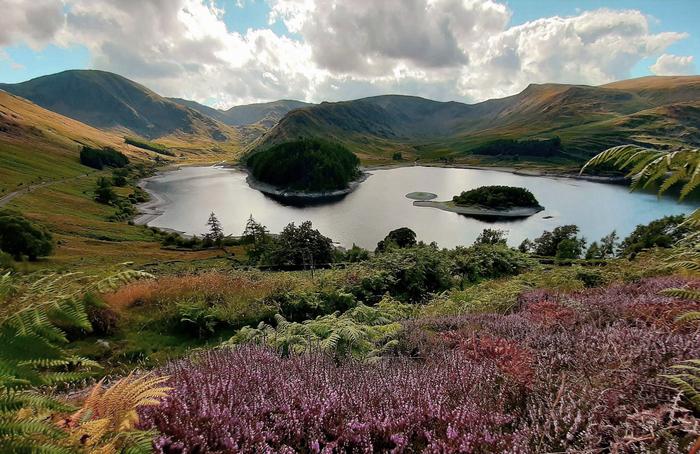Arcadia has made a major new philanthropic donation to the University of Cambridge, taking its total support for the Endangered Landscapes & Seascapes Programme to over $138 million.

Credit: Gosia Niemczura
Arcadia has made a major new philanthropic donation to the University of Cambridge, taking its total support for the Endangered Landscapes & Seascapes Programme to over $138 million.
The Endangered Landscapes & Seascapes Programme supports the large-scale restoration of Europe’s most treasured but endangered ecosystems, enriching biodiversity while revitalising local economies.
The work recognises humanity’s dependence on healthy, functioning ecosystems – for example in preventing urban flooding, and reducing the impacts of climate change.
The Endangered Landscapes & Seascapes Programme is managed by the Cambridge Conservation Initiative, a partnership between the University of Cambridge and ten of the world’s leading international biodiversity conservation organisations.
The Programme supports partners across Europe to deliver ambitious, large-scale restoration projects, aiming to inspire an inclusive and impactful approach. Through partnerships between local communities, policy makers and landowners, projects work to reverse environmental declines to create places where people and nature can thrive.
The new funding includes over $30 million dedicated specifically to efforts to restore Europe’s seas. This will be reflected in the retitled ‘Endangered Landscapes & Seascapes Programme’.
Seas regulate the Earth’s climate, generate oxygen, and provide livelihoods and food for hundreds of millions of people. But Europe’s seas are suffering from pollution, biodiversity loss, seabed damage, overfishing, underwater noise, ocean warming, acidification, and spread of invasive species.
In the EU, 46% of coastal waters suffer from eutrophication – a process that causes excessive plant and algae growth leading to oxygen depletion, and 79% of the coastal seabed is disturbed due to bottom trawling.
The funding will support up to eight new seascape restoration projects that will start the process of restoring damaged marine ecosystems.
Lisbet Rausing and Peter Baldwin, founders of Arcadia, said: “The Endangered Landscapes & Seascapes Programme has become a vibrant network of nature-restoration projects and practitioners across Europe. We are inspired by the commitment of the projects’ teams, and are grateful to them, to the programme’s panel and to the coordinating team, for their invaluable role in realising the programme’s vision.
“As the programme launches its third phase, we look forward to seeing new projects join the Endangered Landscapes & Seascapes Programme network, helping to create resilient, self-sustaining and biodiverse ecosystems that benefit nature and people.”
Dr David Thomas, Director of the Endangered Landscapes & Seascapes Programme, said: “Restoring ecosystems at scale is urgent if we are to address the linked biodiversity and climate emergencies. This new funding from Arcadia will allow a significant expansion of the projects supported by the Endangered Landscapes & Seascapes Programme.
“It’s especially exciting that we will now be able to fund more projects focused on Europe’s seas, where many habitats are in poor condition and species are in decline. Experience shows that with the right interventions, marine ecosystems can recover.”
Professor Deborah Prentice, Vice-Chancellor of the University, said: “It is now widely accepted that reversing the damage humans have done to our natural landscapes and seas is vital for our future prosperity. With this magnificent gift from Arcadia, the Endangered Landscapes & Seascapes Programme can increase investment in projects that help restore ecosystems on a large scale.”
Natural ecosystems support all life on earth, and the damage that has been done to them by human activities has huge costs to our lives and wellbeing. We have reduced nature’s capacity to support us through ecosystem services, such as climate regulation, and provision of clean water and fresh air that we all depend on.
Existing projects funded by the Endangered Landscapes & Seascapes Programme include dam removal in the Danube delta to support migratory fish and vegetation recovery, and work to restore marine ecosystem connectivity in south-western Turkey. Already, these are demonstrating the benefits from restoring nature at the landscape scale.
All projects are underpinned by capacity development, lesson-learning, and robust monitoring to determine what does and doesn’t work in restoration, with results made available through open access to help build knowledge in the wider restoration field.
The UN Decade on Ecosystem Restoration, which runs from 2021 to 2030, is motivating action to restore the world’s degraded ecosystems. And the Global Biodiversity Framework agreed at the 2022 UN Biodiversity Conference has set ambitious targets to have restoration completed or underway on at least 30 percent of the world’s lands, inland waters, coastal areas and oceans by 2030. The new funding will provide a much-needed boost for delivery of these goals.




